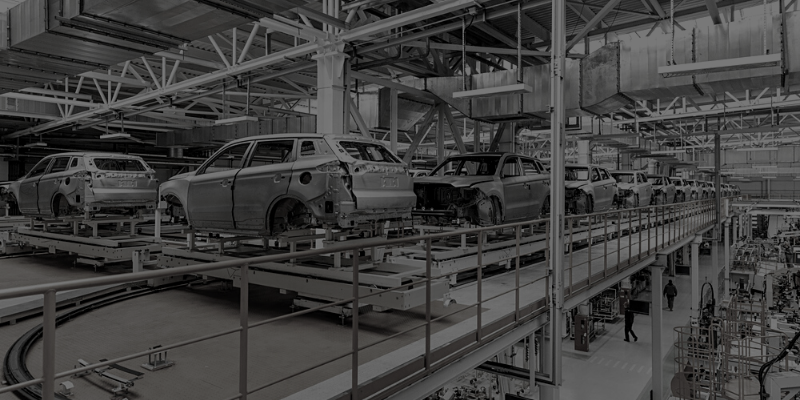Hablar de tecnología 4.0 es hablar de la cuarta revolución industrial; si recapitulamos en el tiempo, la invención de la máquina a vapor y la automatización del trabajo fabril, nos hablan de una primera revolución industrial. La segunda, llega con la producción en cadena, abanderada por la industria automovilística norteamericana a través de Henry Ford y el icónico “Ford Model T”. La tercera revolución, ya más cercana, viene con la conjunción del avance de las tecnologías de las comunicaciones junto al desarrollo y uso de internet y de las energías renovables.
Y como la innovación no se detiene, nos situamos frente a la cuarta revolución industrial, donde la hiperconectividad, el internet industrial de las cosas, la inteligencia artificial, Big Data, cloud computing, robótica colaborativa, uso de impresoras 3D, ciberseguridad, realidad virtual y realidad aumentada, entre otros pilares de la tecnología 4.0, juegan un papel central para la transformación de los procesos productivos con el objetivo de hacerlos más eficientes.
En función de lo anteriormente explicado es que nos resulta imprescindible una convergencia digital entre los componentes industriales, los de negocio y los procesos internos de las empresas.
La industria 4.0 en el sector automotriz representa una evolución total que se inicia con una transformación digital donde las nuevas tecnologías resultan habilitadoras para potencializar el desarrollo del país.
Cabe mencionar que el sector automotriz, desde sus inicios, es pionero en la adopción de nuevas tecnologías y en este momento va liderando la industria 4.0, adoptando tecnologías como:
- La inteligencia artificial para desarrollar coches autónomos,
- El aprendizaje automático para mejorar la eficiencia de sus fábricas,
- La impresión 3D para crear nuevos componentes y piezas para sus coches y prototipos,
- La realidad virtual para mejorar la experiencia de compra de los clientes, y
- La robótica, no solo en la incorporación de maquinaria para la fabricación, si no en la creación de herramientas como los exoesqueletos que son estructuras artificiales usadas de manera externa al cuerpo humano con el fin de apoyar o sustituir en las tareas repetitivas, riesgosas o de precisión.
Por otra parte, en el mercado de los consumidores, existe una creciente demanda que requiere de mejores coches, más baratos y seguros, y es aquí donde entra en juego la innovación.
Beneficios de la industria 4.0 para el sector automotriz
Como ya mencionamos anteriormente, existe una estrecha relación entre el sector automotriz y la industria 4.0 y la misma se encuentra en constante evolución, trayendo emparejados numerosos beneficios.
Algunos de los beneficios más destacados son:
Mayor eficiencia en la producción
La implementación de tecnologías como la automatización, la robótica y la inteligencia artificial ha permitido optimizar los procesos de fabricación, reduciendo los tiempos de producción y mejorando no solo la calidad de los productos si no la de los procesos.
Estos cambios no serían tan efectivos sin la integración de una herramienta que permita extraer datos de los procesos y brindarnos información útil, en tiempo real, para toma de decisiones. Desde MESbook, garantizamos la mejora en la productividad mediante:
Planificación y programación precisa: en la industria automotriz donde la producción suele ser altamente secuencial y dependiente de la precisión en el tiempo, ayuda a planificar y programar la producción de manera precisa. Asegurando que las diferentes operaciones de producción se realicen en el orden correcto y en el momento adecuado, garantizando que tanto la maquinaria como el personal estén ocupados de manera eficiente, reduciendo los tiempos muertos y aumentando la productividad general de la planta.
Reducción de tiempos de inactividad: Al proporcionar visibilidad en tiempo real sobre el estado de las máquinas y los procesos, nuestra empresa permite una detección temprana de problemas y un tiempo de respuesta más rápido. Minimizando los tiempos de inactividad no planificados, lo que, a su vez, aumenta la producción y contribuye a la disminución de costes.
Optimización de la producción: permite visualizar la velocidad de las máquinas y la asignación de recursos según las necesidades cambiantes de la producción. Garantizando un flujo de trabajo eficiente y una producción constante.
Gestión de la mano de obra eficiente: se puede gestionar el personal de manera eficiente, asignando tareas en función de la disponibilidad trabajadores. Esto asegura que cada operador se encuentre contribuyendo al máximo de su capacidad.
Personalización de los vehículos
La industria 4.0 ha facilitado la personalización de los vehículos, permitiendo a los fabricantes ofrecer una mayor variedad de opciones y configuraciones a disposición del mercado. Esto ha derivado en un aumento en la satisfacción del cliente y las ventas.
Mejora en la cadena de suministro
La industria 4.0 ha permitido una mayor conectividad y colaboración entre los diferentes actores de la cadena de suministro, lo que ha llevado a una mejora en la gestión de inventarios, permitiendo una coordinación más eficiente con los proveedores de piezas y componentes, garantizando un suministro justo a tiempo y minimizando el riesgo de escasez de materiales, lo que conlleva finalmente a una mayor eficiencia en la producción y una reducción de los costes.
Mantenimiento predictivo
Utilizando el Internet de las cosas (IoT, por sus siglas en inglés), los fabricantes pueden recopilar datos en tiempo real sobre el rendimiento de los vehículos y anticipar posibles problemas o averías. Esto permite un mantenimiento predictivo y reducir los tiempos de inactividad.
Mejora de la calidad
La industria 4.0 ha permitido desarrollar un sistema de monitorización constante de la calidad durante todo el proceso de fabricación en la industria automotriz. Esto incluye la inspección de componentes, ensamblajes y acabados. La detección temprana de problemas de calidad evita la producción de vehículos defectuosos y, en última instancia, ahorra costos de retrabajo y reparaciones.
Integrando MESbook, esta mejora traducida en términos de Calidad es principalmente correspondida a:
- Control de Calidad en Tiempo Real: MESbook permite el monitoreo constante de la calidad de los productos en todas las etapas del proceso de fabricación. Si se detecta un problema de calidad, el sistema puede tomar medidas inmediatas, como detener la línea de producción o dirigir el producto a una estación de retrabajo, reduciendo así la producción de piezas defectuosas y, por lo tanto, mejora la calidad.
- Registro de Datos de Calidad: MESbook recopila y almacena de manera sistemática datos de calidad detallados en tiempo real. Dichos datos proporcionan un historial completo de la calidad de cada producto fabricado, lo que facilita la identificación de problemas recurrentes y la implementación de medidas correctivas.
- Del análisis de dichos datos podemos derivar en una significativa disminución de costes de la calidad, mediante un estudio estadístico de los procesos y sus defectos, con el consecuente replanteo de los controles de calidad necesarios para garantizar la calidad de los productos sin que esto impacte en los costes de la no calidad.
- Gestión de Reclamaciones y Devoluciones: Con la ayuda de MESbook podemos rastrear los problemas de calidad reportados por los clientes, lo que ayuda a identificar las causas fundamentales de los problemas y tomar medidas preventivas para evitar que se repitan en futuros vehículos. Esto reduce los costos asociados con reclamaciones y devoluciones.
- Análisis de Causa Raíz: Contar con MESbook nos permite tener a disposición diferentes tipos de datos de producción, inspección y otros parámetros relevantes que nos ayudan a identificar la causa raíz de diferentes problemas de calidad, facilitando la resolución de problemas y la implementación de soluciones permanentes.
- Documentación de Procesos: Una de las más importantes colaboraciones de incorporar MESbook , es que nos permite generar documentación electrónica de los procedimientos de fabricación (WI, PFC, CP, etc) y de las especificaciones de calidad (Gamas de calidad, Autocontrol, etc), asegurando que los trabajadores sigan los estándares y los procedimientos establecidos a último nivel de actualización, lo que reduce los errores humanos y garantiza una mayor consistencia en la calidad del producto y evita no conformidades relacionadas a documentación de producción en auditorías.
- Mejora Continua: MESbook proporciona información valiosa para la mejora continua. Los datos recopilados permiten identificar tendencias y patrones de calidad, lo que ayuda a la toma de decisiones basadas en datos para implementar mejoras en los procesos de producción y en la calidad del producto.
Mejora en la seguridad
La incorporación de nuevas tecnologías como sensores y sistemas de inteligencia artificial aplicados a los vehículos, ha contribuido a mejorar la seguridad, reduciendo accidentes y mejorando la detección de posibles fallos en los sistemas.
Basándonos en términos de Seguridad, la incorporación de MESbook es principalmente correspondida a:
- Gestión de Calidad y Control de Procesos: MESbook proporciona un seguimiento en tiempo real de todas las actividades de producción, en las que se encuentran incluidas la inspección y el control de calidad. Esto asegura que los productos cumplan con los estándares de seguridad establecidos y que cualquier defecto que pueda afectar la seguridad sea detectado y corregido de manera oportuna.
- Cumplimiento de Normativas y Regulaciones: La industria automotriz está sujeta a numerosas normativas y regulaciones de seguridad. Con MESbook podemos ayudar a garantizar el cumplimiento de estas regulaciones al generar documentación detallada que demuestre que los procedimientos de fabricación se ajustan a dichas normas de seguridad.
- Gestión de Trazabilidad: MESbook registra datos de trazabilidad detallados para cada producto, lo que facilita la identificación de problemas de seguridad. En caso de un retiro del mercado o una llamada de servicio, una buena gestión de la trazabilidad permite localizar y solucionar problemas en vehículos específicos de manera rápida y eficiente.
- Mantenimiento Predictivo: MESbook pueden ayudar a prevenir problemas de seguridad al programar el mantenimiento preventivo de maquinaria y equipos de producción. Esto reduce el riesgo de fallas inesperadas que podrían poner en peligro la seguridad de los trabajadores, del herramental y afectar la calidad del producto.

Retos de la industria del automóvil
En el sector automotriz, la industria 4.0 ha permitido implementar la digitalización y la automatización en todas las etapas de producción, desde el diseño y desarrollo de vehículos hasta su fabricación y comercialización. Esto ha llevado a la creación de las fábricas inteligentes, donde los sistemas de producción están interconectados y son capaces de tomar decisiones de forma autónoma.
Además, la industria 4.0 también ha impulsado el desarrollo de nuevos modelos de negocio en el sector automotriz, como el carsharing y el ridesharing, donde los vehículos están conectados a través de plataformas digitales y se comparten entre distintos usuarios.
Pero a pesar de todo ello, aún existen algunos retos por delante. Por ejemplo:
La industria automotriz se enfrenta actualmente a una serie de desafíos y retos que están transformando la forma en que se diseña, fabrica y comercializa los vehículos. Algunos de los principales desafíos incluyen:
- Electrificación: El creciente interés por los vehículos eléctricos está obligando a las compañías automotrices a invertir en tecnología de baterías y sistemas de carga más eficientes.
- Conectividad: Los automóviles están cada vez más conectados a través de sistemas de infoentretenimiento, sensores y tecnología de comunicación. Sin embargo, esto también abre la puerta a riesgos de ciberseguridad y protección de datos.
- Automatización: La tecnología de conducción autónoma promete revolucionar la forma en que se conducen los automóviles. Sin embargo, existen desafíos relacionados con la seguridad, la responsabilidad legal y la aceptación del consumidor.
- Movilidad compartida: Los servicios de transporte compartido están cambiando la forma en que las personas utilizan los automóviles. Esto presenta desafíos para los fabricantes de automóviles que deben adaptarse a nuevas formas de propiedad.
- Regulaciones medioambientales: Las regulaciones más estrictas sobre emisiones de carbono están llevando a los fabricantes de automóviles a desarrollar tecnologías más limpias y eficientes. Esto requerirá inversiones significativas.
- Cambios en el comportamiento del consumidor: Los consumidores están cada vez más interesados en vehículos más pequeños, eficientes y personalizados. Esto ha llevado a un cambio en la demanda hacia automóviles más pequeños y económicos, así como hacia vehículos eléctricos y SUV.
- Competencia global: La industria del automóvil se está volviendo cada vez más global, con fabricantes de diferentes países compitiendo entre sí. Esto implica la necesidad de adaptarse a diferentes regulaciones y preferencias del mercado.
Pese a todos estos desafíos, la industria automotriz sigue siendo un importante vector en la economía mundial, y las mismas se encuentran trabajando para superar estos retos y se están preparando para el futuro de la movilidad.
Por ello, en MESbook hemos querido adaptarnos y ofrecer dentro de nuestros softwares una amplia variedad de herramientas encaminadas a que la industria 4.0 y el sector automotriz avancen juntos. Por ejemplo, ofrecemos mejora en la conectividad desde los primeros pasos de la propia fabricación.
Con MESbook la captación de datos digitales y representación de los mismos es automática por lo que, dependiendo de la demanda necesitada, podrán transformarse en información nueva capaz de encaminar a las empresas a tomar decisiones de negocio inteligentes a nivel operativo y estratégico, en lugar de tener acciones reactivas antes los imprevistos como sucedía en el pasado; es decir que los análisis descriptivos, predictivos y de diagnóstico permiten adelantarse a lo que se espera en el futuro para aprovechar, controlar o evitar determinadas situaciones que podrían cambiar el destino de cualquier empresa.
Al mismo tiempo, creamos controles y KPIs que puedan ayudar con las regulaciones medioambientales de plena actualidad. Y todo ello en una herramienta estándar que se adapta a la perfección a la realidad de todas las fábricas de automoción. Y por supuesto, ofrece herramientas que pueden ser especialmente útiles en la fabricación de coches eléctricos.
Sin lugar a duda, nuestro sistema ayudará a tu empresa a competir en un sector en pleno crecimiento.

Product Manager and Quality Systems Engineer en MESbook
José Antonio Nigro
Responsable de la gestión y mantenimiento de la Norma ISO 9001:2015 y responsable de auditorías externas e internas.




